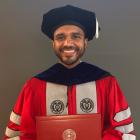Microbiology Alumni

Matthew Dunn, Ph.D. | Summer 2021 Graduate
Graduate school is an excellent opportunity to explore not only science, but also a variety of career paths. The incredibly collaborative nature of the Microbiology department and Ohio State as a whole inspired me to find ways to support science through the people who conduct it rather than from the bench directly. For me, this manifested in my current position as Sales Representative for VWR/Avantor.
While my training is in genetics and molecular biology, I now interact with scientists of many different education and medical-facing disciplines. I get to work with labs to develop spaces where they can be successful and productive, whether that be selecting complex equipment or basic lab supplies. I have the privilege of helping people set science in motion, and for me, that is incredibly fulfilling.
My advice to you is to ask lots of questions, talk to lots of people, and find those who support your journey through science. The Microbiology department is a great place to start your scientific journey, wherever that journey may take you!

Gary Trubl, Ph.D. | Autumn 2018 Graduate
“Gary earned his Ph.D. in microbiology from The Ohio State University in December 2018, where he characterized viruses in soils underlain with permafrost and their roles in ecosystem carbon processing. Gary did his postdoc at Lawrence Livermore National Laboratory (LLNL) in Livermore, California. Gary was co-mentored by Drs. Jennifer Pett-Ridge and Steve Blazewicz and used stable isotope probing combined with metagenomics/viromics to track microbial and viral activity and substrate utilization in various soils. In October 2020, Gary was awarded a Lab Directed Research and Development grant to research how soil moisture acts as a 'master controller' of viral and microbial activity and mortality.
In October 2021, Gary converted to a staff research scientist at LLNL in the Biosciences and Biotechnology Division where he uses meta-omics (e.g., metagenomics, metatranscriptomics, and viromics) combined with other techniques (e.g., isotope probing) to characterize viruses, microbes, and virus-microbe dynamics to better understand the mechanisms viruses use to control microbial cellular-chemistry and the impact on microbial ecophysiology.”

Johnathan Lam, Ph.D. | Autumn 2018 Graduate
Graduate student researchers are project managers in training. You are responsible for experimental design, planning, budgeting, implementation/execution, and verification and validation, all the while balancing cost, schedule, and technical risks, and managing small teams. This set of transferrable skills, along with an ability to quickly adapt and integrate into new environments, is key to opening your career potential as a leader in industry.
Since joining the United States Air Force and Space Force as a civilian acquisition program manager, I’ve been responsible for the 1) maturation and certification of American-made rocket propulsion technology as part of the Air Force’s mission to provide assured access to space and 2) acquisition, integration and implementation of satellite communications technology for resilient command and control. In this role, I manage a diverse group of technical and systems integration engineers, military and civilian personnel, and prime contractors. Part of this responsibility is to balance cost, schedule, and technical performance in order to deliver reliable and resilient capabilities, which requires the ability to be dual hatted; constantly switching between technical and management trains of thought. Additionally, I have had the privilege to observe space technology manufacturing and testing out of Edwards Air Force Base, CA; Kent, WA; Decatur, AL; and Van Horn, TX, and had multiple experiences sitting on console during launches out of Cape Canaveral Space Station, FL. The Air Force also provides educational opportunities in order to develop servant leadership mindsets, amongst other core competencies, constantly stressing the importance of wingmanship and enabling others to perform effectively and efficiently with integrity. I never would have anticipated working in the space domain having completed my dissertation in infectious disease. But, if there is one lesson I can leave, it would be this: You are more than the technical field in which you are trained. Believe in yourself based on the transferrable skills and forward-thinking that you will and have gained during your graduate career.

Qian Shen, Ph.D. | Summer 2019 Graduate
I grew up in China and received my undergraduate degree from China Agricultural University. In 2013, I came to Ohio State University to pursue a Ph.D. degree in microbiology. I joined Dr. Chad Rappleye’s group to study molecular mechanisms of virulence factors in the human fungal pathogen Histoplasma. I graduated in 2019 and continued to work as a postdoctoral researcher in Dr. Rappleye’s group for a year before I joined Rhodes College in 2020 as an Assistant Professor of Biology.
The microbiology Ph.D. program at OSU well equipped me to be successful when I was on the job market. The mandatory one-year teaching assignment provided me with valuable teaching experience. The rigorous candidacy process taught me how to think like an independent researcher and how to write a grant application. Many presentation opportunities (e.g., student seminar and individual lab practice talks) trained me how to be efficient at science communication. My fellow graduate students, especially other lab members in the Rappleye group, generously offered me technical and emotional support throughout my Ph.D. program. I am very grateful for all the training and support received from the OSU microbiology Ph.D. program. I would not have landed my current position without all the support.

Sandro Ataide, Ph.D. | Autumn 2006 Graduate
After graduating in 2006 at The Ohio State University with my PhD in Microbiology under the supervision of Prof Michael Ibba and studying aminoacyl-tRNA synthetases I moved to Berkeley, California to start my first postdoc in the Doudna Lab and start my structural biology research in RNA and RNPs. I then moved to my second post-doc at the ETH (Zurich, Switzerland) in April 2009 to work with Prof Nenad Ban. There I solved X-ray crystal structures of the Signal Recognition Particle in complex with its Receptor (SRP:FtsY) among other structures. In July 2012 I moved to The University of Sydney where I was appointed Lecturer in Structural Biology at the old School of Molecular Bioscience now School of Life and Environmental Sciences (SoLES) and have since started to set up my research. My lab research is focused on antimicrobial development and resistance along with non-coding RNA complexes in bacteria and eukaryotes.

Ran Furman, Ph.D. | Spring 2013 Graduate
I joined the Microbiology Department at The Ohio State University after completing my master’s degree studies at Tel Aviv University, Israel. After three rotations I ended up in Irina Artsimovitch’s lab, working on transcription regulation in bacteria. My studies at the lab were mainly on structure/function of proteins and protein-nucleic acid interactions. That knowledge proved to be extremely useful throughout my career. After graduation I joined the University of Pennsylvania as a postdoctorate fellow, working on the etiology and treatment of Alzheimer’s disease. One of the most important lessons I learned in my postdoc is that no matter which field you are working on, whether its Alzheimer’s disease, bacterial transcription, proteomics or lipidomics, the same scientific principles apply; therefore, a clear and critical scientific thinking is the most important things you can get from your PhD. Consistently, the critical scientific thinking I’ve learned during my PhD studies was instrumental for my success later in life.
After my postdoc studies I joined Bristol Myers Squibb, where I worked as a senior scientist in the Biochemical and Physical Protein Characterization Department. In this job, I’ve utilized my experience in protein structure/function to lead the scientific development of drugs, targeting cancer, infectious diseases, cardiovascular diseases and more. Recently, I have decided to move back to Israel, where I accepted a position as the head of discovery in a pharmaceutical company, which targets neurodegenerative disorders. In this role, I will head the discovery of new drugs for diseases like Alzheimer’s and autism.
Ultimately, my career path took me farther away from where I started; from academia to industry, from microbiology to neuroscience and from US to Israel, yet, regardless of which scientific discipline I am in, the scientific tools I gained in the PhD are as useful as ever.

Rodney Tollerson, Ph.D. | Autumn 2019 Graduate
I earned my bachelor's of science in Microbiology from the University of Arizona. There I studied how pathogenic bacteria attach to organic leafy vegetables using traditional microbiological and imaging techniques. I was interested in gaining a better understanding of molecular biology and genetics for my PhD which is why I decided to join the Microbiology department at Ohio State. I joined Michael Ibba's lab and studied the mechanisms controlling translation regulation in bacteria. Currently, I am a postdoctoral fellow at Caltech applying what I learned about in model bacteria to non-model organisms such as methanogenic archaea.
At first, I was unsure what I wanted to do with my career and wavered mostly between industry and government work. I was given a great opportunity with the Cellular, Molecular, and Biochemical Sciences Training Program to explore career opportunities. Over time, I learned that I enjoyed working with undergraduate students and mentorship, which led me toward a more traditional academic path. I also had opportunities to help with organizing workshops and recruitment through the graduate student organization.

Sam Yadavalli, Ph.D. | Summer 2012 Graduate
Hi! I go by Sam or Samhita. I am an Assistant Professor of Genetics at the Waksman Institute of Microbiology at Rutgers, The State University of New Jersey. My lab studies mechanisms underlying bacterial stress response and antimicrobial resistance focused on the role of small proteins and epitranscriptomic regulators. I did my postdoctoral work studying bacterial signaling systems with Dr. Mark Goulian at the University of Pennsylvania and I was a research associate in Dr. Bryce Nickels’ lab at Rutgers prior to my current position.
I earned my Ph.D. at the Department of Microbiology at The Ohio State University in 2012. I did my graduate work in Dr. Michael Ibba’s lab, where I studied mechanisms of translation quality control at the level of aminoacyl-tRNA synthetases. My training in the Ibba lab prepared me to work independently, hone my critical thinking and problem-solving skills, and laid a strong foundation for my scientific career. I also learned a lot from interactions with labs and people outside of my own. RNA Biology was well-established at OSU even before the Center was formally named and I benefitted a lot by attending the seminars hosted by this group of RNA experts and interacting with them at symposia. OSU Microbiology and the university in general not only helped me grow professionally but also provided me with an excellent environment for personal fulfillment, especially as an international student. The socio-cultural diversity of the student body at this university is remarkable and helped me form long-lasting friendships beyond graduate school.
